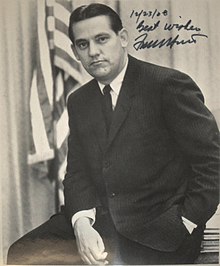
The 1968 United States presidential election was the 46th quadrennial presidential election, held on Tuesday, November 5, 1968. The Republican nominee, former vice president Richard Nixon, defeated both the Democratic nominee, incumbent vice president Hubert Humphrey, and the American Independent Party nominee, former Alabama governor George Wallace.
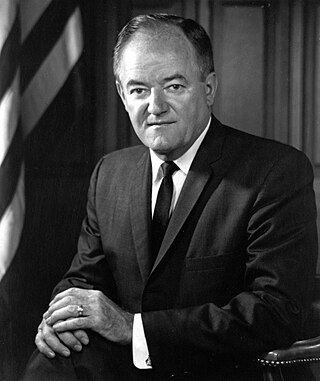
Hubert Horatio Humphrey Jr. was an American politician and statesman who served as the 38th vice president of the United States from 1965 to 1969. He twice served in the United States Senate, representing Minnesota from 1949 to 1964 and again from 1971 to 1978. As a senator he was a major leader of modern liberalism in the United States. As President Lyndon B. Johnson's vice president, he supported the controversial Vietnam War. An intensely divided Democratic Party nominated him in the 1968 presidential election, which he lost to Republican nominee Richard Nixon.

Lyndon Baines Johnson, often referred to as LBJ, was an American politician who served as the 36th president of the United States from 1963 to 1969. He became president after the assassination of John F. Kennedy, under whom he had served as the 37th vice president from 1961 to 1963. A Democrat from Texas, Johnson also served as a U.S. representative and U.S. senator.

Russell Billiu Long was an American Democratic politician and United States Senator from Louisiana from 1948 until 1987. Because of his seniority, he advanced to chairman of the Senate Finance Committee, serving for fifteen years, from 1966 to 1981, during the implementation of President Lyndon Johnson's Great Society and War on Poverty programs. Long also served as Assistant Majority Leader from 1965 to 1969.
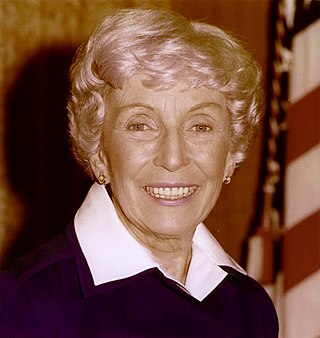
Muriel Fay Humphrey Brown was an American politician who served as the second lady of the United States from 1965 to 1969, and as a U.S. Senator from Minnesota in 1978. She was married to the 38th vice president of the United States, Hubert Humphrey. Following her husband's death, she was appointed to his seat in the United States Senate, serving for most of the year 1978, thus becoming the first woman to serve as a senator from Minnesota, and the only Second Lady of the United States to hold public office. After leaving office, she remarried and took the name Muriel Humphrey Brown.

Ralph Webster Yarborough was an American politician and lawyer. He was a Texas Democratic politician who served in the United States Senate from 1957 to 1971 and was a leader of the progressive wing of his party. Along with Senate Majority Leader Lyndon B. Johnson and Speaker of the House Sam Rayburn, but unlike most Southern congressmen, Yarborough refused to support the 1956 Southern Manifesto, which called for resistance to the racial integration of schools and other public places. Yarborough voted in favor of the Civil Rights Acts of 1957, 1960, 1964, and 1968, as well as the 24th Amendment to the U.S. Constitution, the Voting Rights Act of 1965, and the confirmation of Thurgood Marshall to the U.S. Supreme Court. Yarborough was the only senator from a state that was part of the Confederacy to vote for all five bills.

Albert Arnold Gore Sr. was an American politician who served as a United States Senator from Tennessee from 1953 to 1971. A member of the Democratic Party, he previously served as a U.S. Representative from the state's 4th congressional district from 1939 to 1953. He was the father of Al Gore, who served as the 45th vice president of the United States from 1993 until 2001, and held Tennessee's other U.S. Senate seat from 1985 to 1993. A native of Granville, Tennessee, Gore graduated from Middle Tennessee State Teachers College and taught school. From 1932 to 1936 he was superintendent of schools for Smith County. He attended the Nashville Y.M.C.A. Night Law School, now the Nashville School of Law, from which he graduated in 1936.

Thruston Ballard Morton was an American politician. A Republican, Morton represented Kentucky in the U.S. House of Representatives and the U.S. Senate.

The 1964 United States Senate elections were held on November 3. The 33 seats of Class 1 were contested in regular elections. Special elections were also held to fill vacancies. They coincided with the election of President Lyndon B. Johnson by an overwhelming majority, to a full term. His Democratic Party picked up a net two seats from the Republicans. As of 2023, this was the last time either party has had a two-thirds majority in the Senate, which allowed the Senate Democrats to override a veto, propose constitutional amendments, or convict and expel certain officials without any votes from Senate Republicans. However, internal divisions would have prevented the Democrats from having done so. The Senate election cycle coincided with Democratic gains in the House in the same year.

John James "Whispering Willie" Williams was an American businessman and politician from Millsboro, Delaware. He was a member of the Republican Party and served four terms as U.S. senator from Delaware from 1947 to 1970.
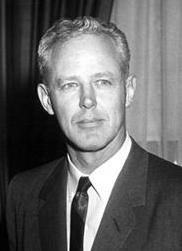
Charles Burnham "Bud" Wilkinson was an American football player, coach, broadcaster, and politician. He served as the head football coach at the University of Oklahoma from 1947 to 1963, compiling a record of 145–29–4. His Oklahoma Sooners won three national championships and 14 conference titles. Between 1953 and 1957, Wilkinson's Oklahoma squads won 47 straight games, a record that still stands at the highest level of college football. After retiring from coaching following the 1963 season, Wilkinson entered into politics and, in 1965, became a broadcaster with ABC Sports. He returned to coaching in 1978, as head coach of the St. Louis Cardinals of the National Football League (NFL) for two seasons. Wilkinson was inducted into the College Football Hall of Fame as a coach in 1969.
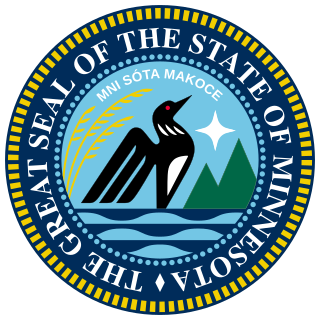
Minnesota is known for a politically active citizenry, with populism being a longstanding force among the state's political parties. Minnesota has consistently high voter turnout, ranking highest or near-highest in recent elections. This is due in part to its same-day voter registration laws; previously unregistered voters can register on election day, at their polls, with evidence of residency.

The 1976 Iowa Democratic presidential caucuses were held on January 19, 1976, the first nominating contest in the Democratic presidential primaries for the 1976 presidential election. It had the little-known Governor of Georgia Jimmy Carter campaign heavily and end up capturing 27.7% of the vote, the highest of the five candidates. An outpouring of media coverage of Carter soon emerged.

Electoral history of Lyndon B. Johnson, who served as the 36th president of the United States (1963–1969), the 37th vice president (1961–1963); and as a United States senator (1949–1961) and United States representative (1937–1949) from Texas.

The 1968 presidential campaign of Hubert Humphrey began when Vice President of the United States Hubert Humphrey of Minnesota decided to seek the Democratic Party nomination for President of the United States following President Lyndon B. Johnson's announcement ending his own bid for the nomination. Johnson withdrew after an unexpectedly strong challenge from anti-Vietnam War presidential candidate, Senator Eugene McCarthy of Minnesota, in the early Democratic primaries. McCarthy, along with Senator Robert F. Kennedy of New York, became Humphrey's main opponents for the nomination. Their "new politics" contrasted with Humphrey's "old politics" as the increasingly unpopular Vietnam War intensified.

The 1966 United States elections were held on November 8, 1966, and elected the members of the 90th United States Congress. The election was held in the middle of Democratic President Lyndon B. Johnson's second term, and during the Vietnam War. Johnson's Democrats lost forty-seven seats to the Republican Party in the House of Representatives. The Democrats also lost three seats in the U.S. Senate to the Republicans. Despite their losses, the Democrats retained control of both chambers of Congress. Republicans won a large victory in the gubernatorial elections, with a net gain of seven seats. This was the first election held after the passage of the Voting Rights Act of 1965, which led to a surge in African-American voter participation.
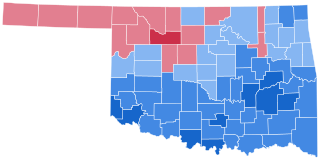
The 1964 United States presidential election in Oklahoma took place on November 3, 1964. All fifty states and The District of Columbia were part of the 1964 United States presidential election. Voters chose eight electors to the Electoral College, who voted for president and vice president.

The 1968 United States presidential election in Mississippi was held on November 5, 1968. Mississippi voters chose seven electors, or representatives to the Electoral College, who voted for President and Vice-President. During the 1960s, the Civil Rights Movement dictated Mississippi's politics, with effectively the entire white population vehemently opposed to federal policies of racial desegregation and black voting rights. In 1960, the state had been narrowly captured by a slate of unpledged Democratic electors, but in 1964 universal white opposition to the Civil Rights Act and negligible black voter registration meant that white Mississippians turned almost unanimously to Republican Barry Goldwater. Goldwater's support for "constitutional government and local self-rule" meant that the absence from the ballot of "states' rights" parties or unpledged electors was unimportant. The Arizona Senator was one of only six Republicans to vote against the Civil Rights Act, and so the small electorate of Mississippi supported him almost unanimously.

The 1968 United States presidential election in Florida was held on November 5, 1968. Florida voters chose fourteen electors, or representatives to the Electoral College, who voted for president and vice president.

The 1964 United States Senate special election in Oklahoma took place on November 3, 1964. Democratic senator Robert S. Kerr, who won re-election to his third term in 1960, died in office on January 1, 1963. Governor J. Howard Edmondson resigned from office so that his lieutenant governor, George Nigh, could appoint him to the U.S. Senate. Edmondson ran for election in the ensuing special election, and faced strong competition from former governor Raymond D. Gary and State Senator Fred R. Harris. Edmondson placed first in the primary, but failed to win a majority, with Harris narrowly beating out Gary for second place. In the runoff, Harris defeated Edmondson in a landslide. In the general election, Harris faced former Oklahoma Sooners football coach Bud Wilkinson, the Republican nominee. Even though President Lyndon B. Johnson won Oklahoma by a wide margin over Republican presidential nominee Barry Goldwater, the Senate race was much closer. Ultimately, Harris only narrowly defeated Wilkinson by just 2% of the vote.
